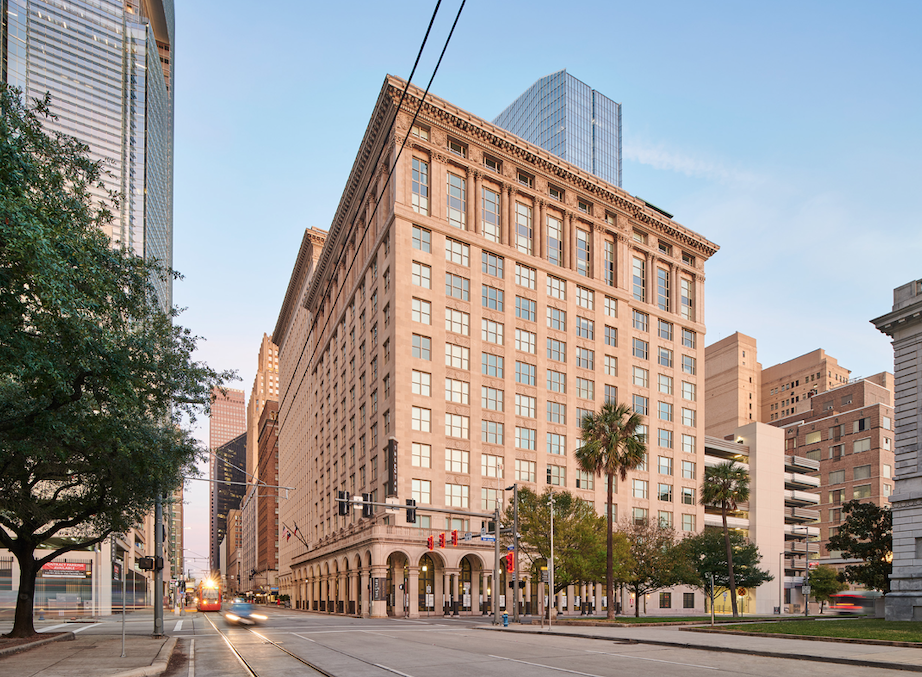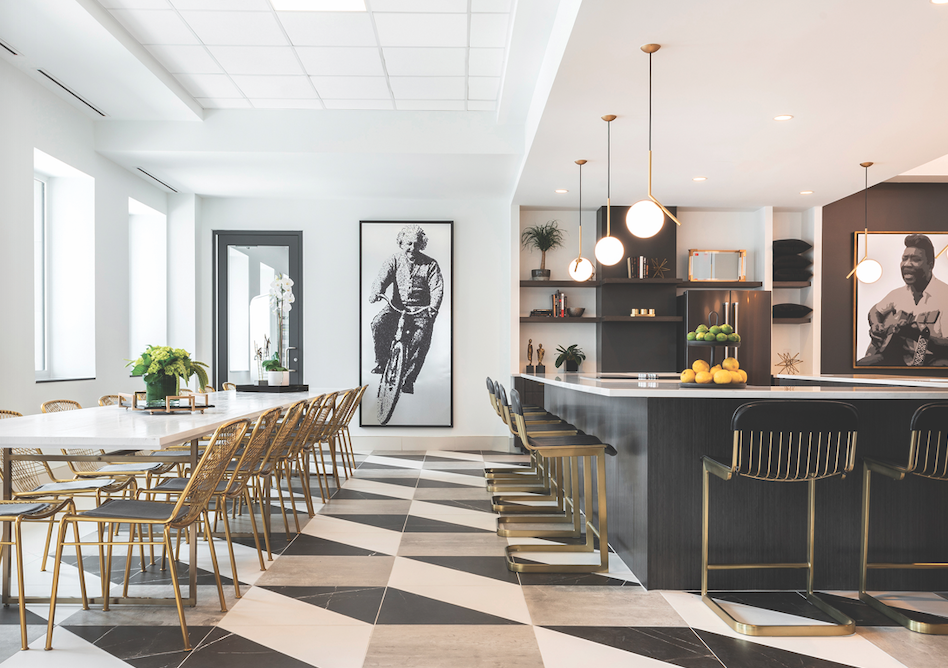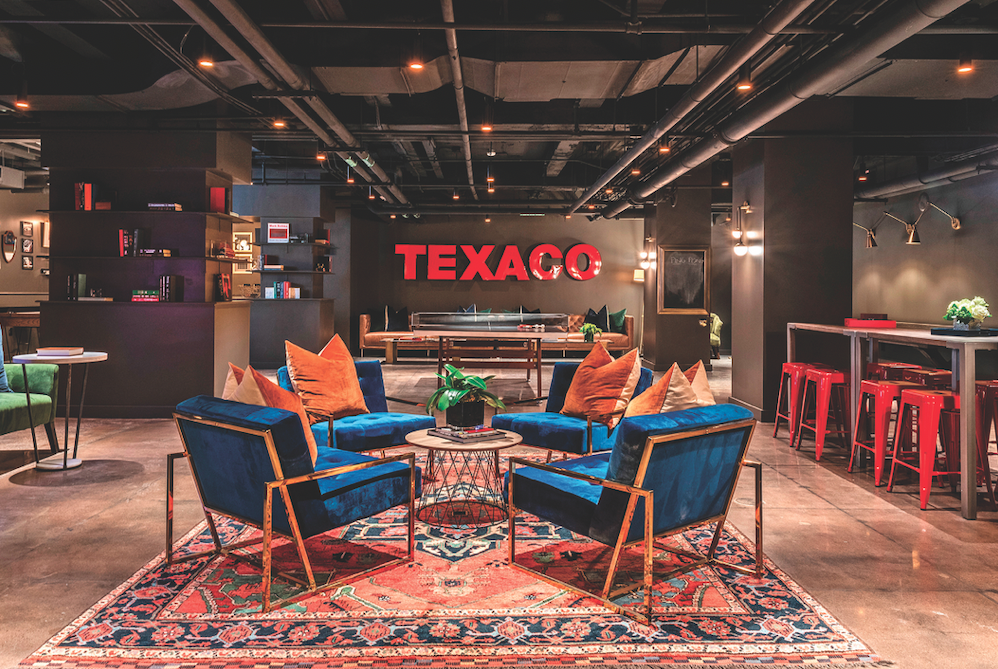After sitting vacant for nearly three decades, the former home of Texaco, Inc. has been converted into a 17-story, 286-unit apartment building in the heart of downtown Houston.
Dallas-based Provident Realty Advisors, which led the $99.5 million enterprise, renamed the property “The Star” as a tribute to the oil giant’s logo—“the big bright Texaco star!” in the old advertising jingle. The redevelopment came on the heels of several unsuccessful attempts to turn the building into a hotel in the years following Texaco’s relocation to the Houston suburbs in 1989.
“It was a beautiful but derelict building right in the center of the new downtown core, surrounded by new office developments, shopping, entertainment, and nightlife,” said Kip Platt, Director of Development and Acquisitions at Provident Realty Advisors.
The Renaissance Revival–style building features a brick, terracotta, and limestone façade, with signature vaulted arcades at street level that promote pedestrian activity. The original 13-story building, completed in 1915, was designed by Warren and Wetmore, a New York architecture firm whose portfolio includes Manhattan’s Grand Central Terminal. A 1938 annex expansion and a 16-story addition, completed in 1958, bulked up the structure to fill a city block. In 2003, the building was placed on the National Register of Historic Places.
The redevelopment team worked closely with the National Park Service and the Texas Historical Commission to qualify for federal and state historic tax credits. The Star was also the first project to benefit from Houston’s new Downtown Living Initiative, which awards $15,000/unit in tax incentives to developers who create new residential projects in the urban core.
 At one time a “ beautiful but derelict building,” according to developer Kip Platt, Provident Realty Advisors, The Star now provides 286 luxury apartments in downtown Houston. The original 17-story structure, completed in 1915, was placed on the National Register of Historic Places in 2003. Photo: Peter Molick
At one time a “ beautiful but derelict building,” according to developer Kip Platt, Provident Realty Advisors, The Star now provides 286 luxury apartments in downtown Houston. The original 17-story structure, completed in 1915, was placed on the National Register of Historic Places in 2003. Photo: Peter Molick
“Most of the structural elements were in really good shape. The building just needed some thorough cleaning, repair, and restoration,” said Robert Jurbergs, AIA, LEED GA, Principal at HBG Design, the Memphis-based architecture firm that oversaw the redesign.
HBG followed strict historic preservation requirements in restoring the structure’s distinctive features, notably its limestone columns, mosaic tiles, decorative chandeliers, bronze grilles, and historic clock. To improve thermal performance, the project team added exterior envelope insulation and specified new energy-efficient windows. “We went back to the original blueprints to ensure the new window profiles were as true to the original wood detailing as possible,” said Jurbergs.
The most pressing problem was how to fit a high-efficiency mechanical system with an additional layer of plumbing, fire protection lines, and mechanical ducts for apartments into a century-old office building.
According to Mark Weaver, FAIA, Principal at HBG Design, the project team circumvented this obstacle by building a 66,000-sf extension on the back side of the original L-shaped building, where historic preservation restrictions were less stringent. This gave them five more high-ceiling apartments with balconies on each floor. They also carved out a cozy outdoor courtyard for a heated, resort-style swimming pool.
The project team squeezed in a nine-level, 750-space parking garage for use by both residents and the general public. The Star sits on the city’s light rail system and ties into the Houston tunnel system, a network of subterranean pedways that links 95 city blocks.
STEPPING BACK INTO HISTORY
The Star’s interior spaces blend contemporary styling with intentional nods to its origins. Large-scale historical photos of the original structure are prominently displayed in the majestic ground-floor lobby. The original Texaco brass elevators have been emboldened with a black geometric design that runs throughout the building.
“It made sense to highlight this amazing, architecturally significant building rather than trying to hide it or make people think it was a new building,” said Lauren Parsons, a design and branding consultant who led the interior design of the amenity spaces. “I wanted it to have a timeless look.”
 Photos of Albert Einstein, Muddy Waters, and others linked to the year 1915 embellish the 17th-floor amenities space, which has a lounge, display kitchen, and Equinox-inspired fitness center. Photo: Lauren Parsons
Photos of Albert Einstein, Muddy Waters, and others linked to the year 1915 embellish the 17th-floor amenities space, which has a lounge, display kitchen, and Equinox-inspired fitness center. Photo: Lauren Parsons
Parsons lived in the building as it was being completed. She curated an eclectic mix of Texaco memorabilia from former employees and collectors for display in the expansive basement game room and lounge area, a dimly lit space that takes its cue from Prohibition-era speakeasies.
The property has 207 one-bedroom and 79 two-bedroom units, with 22 different floor plans ranging from 730 to 1,730 sf, on levels two through 16. Apartments have 11-foot ceilings, quartz countertops, custom cabinetry, stainless steel appliances, and oversized soaking tubs. Monthly rents range from $1,750 to $3,860.
A 1915 design motif extends to the building’s 17th-floor penthouse level, which showcases large-scale black-and-white portraits of Billie Holiday and other cultural figures loosely linked to the year the original building was completed.
AN INTERESTING MIX OF TENANTS
The location can’t be beat. The property is adjacent to the city’s shopping and historic districts and located within 160 feet of 8,000 jobs. The Star is about 90% leased, according to Provident Realty Advisors’ Platt.
“It’s an eclectic group of people who live in the building—from professional basketball players, to artists, to attorneys,” he said. “Anybody can go live in a shiny glass high-rise, but you can’t duplicate the look or character of a historic building. There’s just a unique vibe to it.”
On the project team
DEVELOPER: Provident Realty Advisors ARCHITECT HBG Design INTERIOR DESIGNER Lauren Parsons MECHANICAL/PLUMBING ENGINEER Haltom Engineering ELECTRICAL ENGINEER DePouw Engineering ELEVATOR CONSULTANT Lerch Bates Company GC Provident Realty Advisors Construction
Related Stories
| Aug 11, 2010
New website highlights government tax incentives for large commercial buildings
Energy Retrofit Group (ERG), the subsidiary of 40-year-old, award-winning Adache Group Architects, Inc., has announced the creation of their new energy conservation web site: www.energy-rg.com.
| Aug 11, 2010
Gensler, HOK, HDR among the nation's leading reconstruction design firms, according to BD+C's Giants 300 report
A ranking of the Top 100 Reconstruction Design Firms based on Building Design+Construction's 2009 Giants 300 survey. For more Giants 300 rankings, visit http://www.BDCnetwork.com/Giants
| Aug 11, 2010
Parsons Brinckerhoff, Dewberry among nation's largest multifamily design firms, according to BD+C's Giants 300 report
A ranking of the Top 75 Multifamily Design Firms based on Building Design+Construction's 2009 Giants 300 survey. For more Giants 300 rankings, visit /giants
| Aug 11, 2010
ASHRAE introduces building energy label prototype
Most of us know the fuel efficiency of our cars, but what about our buildings? ASHRAE is working to change that, moving one step closer today to introducing its building energy labeling program with release of a prototype label at its 2009 Annual Conference in Louisville, Ky.
| Aug 11, 2010
RMJM unveils design details for $1B green development in Turkey
International architecture company RMJM today announced details of the $1 billion Varyap Meridian development it is designing in Istanbul’s new residential and business district, which will be one of the "greenest" projects in Turkey. The luxury 372,000-square-meter development on a site totalling 107,000 square meters will be located in the Atasehir district of Istanbul, which the Turkish government intends to transform into the country’s new financial district and business center.
| Aug 11, 2010
Urban Land Institute honors five 'outstanding' developments in Europe, Middle East, and Africa
Five outstanding developments have been selected as winners of the Urban Land Institute (ULI) 2009 Awards for Excellence: Europe, Middle East, and Africa (EMEA) competition. This year, the competition also included the announcement of two special award winners. The Awards for Excellence competition is widely regarded as the land use industry’s most prestigious recognition program.
| Aug 11, 2010
10 tips for mitigating influenza in buildings
Adopting simple, common-sense measures and proper maintenance protocols can help mitigate the spread of influenza in buildings. In addition, there are system upgrades that can be performed to further mitigate risks. Trane Commercial Systems offers 10 tips to consider during the cold and flu season.
| Aug 11, 2010
Brad Pitt’s foundation unveils 14 duplex designs for New Orleans’ Lower 9th Ward
Gehry Partners, William McDonough + Partners, and BNIM are among 14 architecture firms commissioned by Brad Pitt's Make It Right foundation to develop duplex housing concepts specifically for rebuilding the Lower 9th Ward in New Orleans. All 14 concepts were released yesterday.
| Aug 11, 2010
NAVFAC releases guidelines for sustainable reconstruction of Navy facilities
The guidelines provide specific guidance for installation commanders, assessment teams, estimators, programmers and building designers for identifying the sustainable opportunities, synergies, strategies, features and benefits for improving installations following a disaster instead of simply repairing or replacing them as they were prior to the disaster.
| Aug 11, 2010
MulvannyG2 Architecture wins “Best Mixed-use Development—Future” award
MulvannyG2 Architecture’s project, Aquapearl in Taipei, Taiwan, was honored by Cityscape Asia 2009 as the “Best Mixed-use Development -Future” on May 20, 2009 at the annual conference in Singapore.







